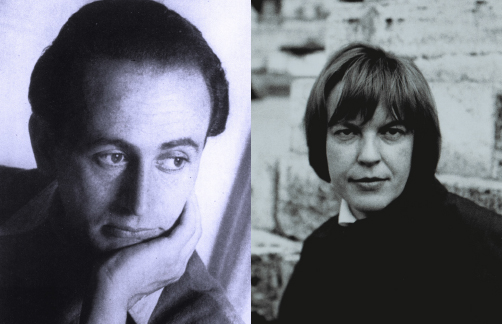Melville’s Beard
Las barbas de Melville
Mark Haber
HERMAN MELVILLE’S BIG book about the whale hadn’t done as well as he’d expected and twenty-five days after its publication he sat brooding in the kitchen, tugging at his beard. His wife, Elizabeth, sat across the table attempting to ignore the intense brow of her husband that only promised an afternoon of arguing.
“I should’ve perhaps made the whale into something different,” he mused, “something more palpable, more earth-bound.”
“You did your best.”
He sighed, “symbolism…”
He produced an orange and with a small pocketknife began to peel it. Elizabeth set down her needlepoint. Summer had announced itself that very morning with its intense warmth permeating the drapery and casting figures of light upon the nook in the kitchen.
“Maybe it is a big book, maybe it is rough treading, but I couldn’t just slice the book in half, it would’ve been like slicing my own arm.”
Herman looked at his wife then slumped in his chair, knowing he was wasting his words on a vacant audience. She loved Herman and that was the problem. Herman wanted a comprehension that would contradict his ideas, gawk his prophecies. The fights they shared were decent but they were between man and wife, thus lacking any of the fortitude, the meat required to prove his genius.
He ate a slice of orange and the juice escaped his lips and wet the surrounding whiskers of his face.
“There are other books in you.”
“I know that.”
“I’m only saying. We’re all of us tired. Fifteen months of your railing about that fish.”
“It’s not a fish…”
“The mammal. My apologies. But it’s finished now and you have to move on.”
But he couldn’t move on. How does one move on after casting his soul on paper? How does one endure unmarked? Herman was different, the world was different, a fact he nor his wife could refute. And the change was indiscernible, but as certain as death or the four decades of obscurity that awaited him. The other books were good, fine even, but this one was something else. Though still young – he was only 32 – he’d already begun to wear the accumulation of life’s disregards; they collected in the most unlikely places. His shoulders seemed heavier, thicker, more resilient but also more ravaged, as if he’d won the battles but with each subsequent assault his strength had been lessened, leaving him fragmented and, if not broken, nearly broken.
His beard, normally groomed to the times, had grown to lengths suggesting homelessness or lunacy. The hair had literally burst forth, adapting to the progress of his book, zigzagging outwards as if staking out its own quest for a whale. His face began to resemble the mute and noble fury of a lion. He refused to have the clippers set upon it and whenever Elizabeth, hair in bun, approached with scissors and that dignified look almost passing itself off as peace, Herman would retreat to the refuge of his study, not to be bothered.
The boys had also noticed. They stayed upstairs – if home – or gave excuses to friends as to why they should loiter at someone else’s house. They had lived with the man while he wrote the book; the tantrums, the harried pacing that exuded devotion and frenzy but certainly not normalcy. Their father’s implacable attention to details while not noticing he’d worn the same bathrobe for two weeks that carried the stench of anchored flesh. He’d leave the house to go walking and not return for six or seven hours, covered in hoarfrost, beard matted, eyes frantic and ravished and often bringing along a fever the way an ordinary man brought home paychecks.
Elizabeth boiled some water for tea. Although she came from a good family she had a filthy mouth and Herman had spent time enough on the ocean to appreciate her tongue. The swear words had only emerged after five years of marriage and instead of shame or even madness, Herman found a perverse satisfaction in his wife’s vernacular. It also allowed him to let loose with his own colorful speech and not feel any guilt. Around the boys Elizabeth appeared docile, but alone with Herman she spewed obscenities like a fiend. Both of their tempers resembled one another and, accordingly, relied on each other to give them their essence, the acute sense of personality that one calls wit.
“Did you get the check?” she asked.
“Not yet.”
“Thaniel’s not going to pay you. He would’ve paid you by now if he intended.”
“He’s busy.”
“Oh I forgot, his projects.”
Herman had lent Nathaniel Hawthorne fifty dollars on his last visit in order to have the wheel of his carriage fixed. Herman had made the mistake of telling his wife, whose fiscal responsibilities were fixed in a Puritan mindset. She wouldn’t let up about the money and the topic was only becoming more deep-rooted. Each day she asked the same question, only more often, as if the mail could be delivered more than twice a day. Herman also had noticed the sick security his wife found in his friend’s thoughtlessness.
“Yes,” she said, the water starting to boil, “Thaniel goes to England, Thaniel goes to the capitol, but Thaniel can’t find it in his heart to pay you back your fifty dollars.”
“Your fifty dollars!” He exploded. “If it were mine I wouldn’t be hearing about it.”
“If it were yours you’d of spent it on drink!”
“On ink!”
“Up yours.”
“Up yours.”
“Good-for-nothing.”
“Whore.”
“Hack.”
Elizabeth set the cup in front of Herman and poured the boiling water.
“He’ll pay me.”
“He won’t and you know it.”
Herman knew his wife begrudged Nathaniel. Ever since she’d discovered the whale-book had been dedicated to him, changed, as it were, at the last minute. Each subsequent book Herman wrote had been promised her, and the way he had raved and suffered through this one’s creation she felt more than deserving in regards to its dedication. During the various drafts he assured her the book’s dedication belonged to her but after its completion he’d retracted the vow when he caught her being dishonest about having read the entire manuscript. It was the easiest trick in the world for a writer: ask a simple question about the end. The end.
Elizabeth had taken a chance and stupidly told her husband she was glad that Ahab had retracted his designs and gotten home safely.
“Are you fucking kidding me?”
She realized the mistake as soon as it had left her lips. His wife’s lie was the cruelest of verdicts. Herman’s audience had yet to give the author its reaction, that of indifference, and his wife’s reception seemed like a prophecy of what was to come. Herman disappeared in a fury, she knew not where until the following month when the first editions of the book appeared on their doorstep and Elizabeth, instead of finding her own name in the inscription, discovered Hawthorne’s: “In Token For My Admiration For His Genius…”
She deflated; he went to the printer’s, that son of a bitch! She stalked the house, picking up odds and ends and dusting them to work off her rage. She broke several of the figurines she had collected since childhood.
Genius! Genius! Why this obsession with genius? Genius is the cause of the world’s troubles! Isn’t it enough to have talent, nay, not even that but decency? Once this word genius surfaces it means only strife and unrest. Men think they can behave however they want because of genius!
Herman had suffered visions, delusions – his beard began speaking to him, literally – angels appeared on the sill beyond his desk while he wrote the seemingly endless chapters of his voyage. And his wife had answered these months of inspiration with, of all things, deception. Days went by; neither spoke to the other nor did they desire getting caught speaking to one of the boys. Herman, pale and distracted, shuffled in and out of the house, husband and wife waiting for the other to concede first.
Finally, after ten days Herman approached Elizabeth from behind and spanked her butt playfully. An explicit expression told Herman to lay off her ass.
Herman had piloted the family into debt with the ease and disregard of writing a story for some pseudo-literary periodical. The libraries he used to amass all the erudite facts about leviathans and spermaceti and the motley types of harpoons. Arcane facts. Obscure details. Herman had used everything in his soul to fashion a work of art, Biblical in proportion, something he felt the animal he was describing deserved. For an entire year the librarians had nudged one another as he stumbled through the door, austere, unnecessarily serious, wiping the snow from his coat and hat or, inversely, the sweat. At first they begrudged the eccentric author his hours, the way he fished amongst the dusty piles or pleaded to be allowed more than five books to take home, as if his very soul were hovering above the coals. After the book’s completion and beyond his knowledge, the librarians had actually begun to miss him, asking one another if they had seen the heavy-cloaked visage, the harried brow with the grave beard.
Herman offered his wife a wedge of orange. She declined. He continued eating, the neglected rind coating his fingers. Herman had always been a messy eater and despite his wife’s endeavors wouldn’t change his habits. Often out of superstition or perhaps indolence he’d go weeks without changing his undergarments, especially during a period of writing.
These periods could last up to a month. A trail of stench, of lived-in flesh followed him about the house, to the printers, along the streets of Manhattan where a keen observer might nudge their companion and remark that’s the guy who wrote that island story. Yeah, who? Melville. Herman Melville. I thought he’d died. Both treating the author’s life with the indifference one would give to a stranger’s sneeze or a half-interesting story in the papers.
“I’m sorry.” Liz suddenly said, picking up the strand of the only argument that mattered to her husband.
“Sorry for what, my dear? Not making it through the book or lying about it?”
“I’ve finished it since.”
He grumbled.
“I’m sorry for the dishonesty. The one thing I always promised you, faithfulness, and I betrayed you. I’m sorry that I couldn’t make it through your book. Please understand, it’s rather tedious.” She cleared her throat. “And I mean that in a good way. Milton is tedious.”
“Tedious or not, you told me you read it, told me you loved it, ‘your best work ever Herman!’ Bah!”
“It is a big book.”
“No bigger than your talent at telling lies.”
Elizabeth’s face blossomed at the thought of her retort. “If my supposed talent matched yours we wouldn’t be dodging debt collectors would we?”
This was their first true fight since the initial row about her having finished the book and Herman was a little relieved to see his wife had returned. He’d felt bad about retracting the dedication but bad in the way a parent feels when withholding desert from a misbehaving child or not giving in to tantrums at the store.
They finished their tea and Elizabeth attached her bonnet. “I’ll check the mail.”
Surprised at himself for being so wound up so early in the morning he raised his voice. “If there’s nothing from Nathaniel I don’t wanna hear it.”
Moments later she returned, empty handed. She sat across from Herman, unfolded her hands in the hopes of receiving his. She looked unflinching, silently pleading. Both knew there was little money left in the savings, none coming in. What she received from her family, there was that, and besides that, what? The profits from the book, if any, wouldn’t arrive for weeks or even months. Sad though it was, Hawthorne’s fifty dollars wouldn’t merely be helpful; it was necessary.
“The boys need clothes.” She said. “New shoes.”
“Goddamnit. Alright.”
Herman left the house and took to the sidewalk. Though he didn’t know it himself, he was about to continue the routine he’d begun – and faithfully followed – over the past month. Often he set out with the best of intentions, convinced he would finally send word to Nathaniel asking kindly about the money. However Herman went where his legs led him. Though he’d maintained the fiction of writing his friend, Herman, in reality, was simply pacing the city, taking large, day-long loops that ultimately brought him back home once the boys were asleep and Elizabeth had lit candles in the windows. Sometimes he stopped for tea or a newspaper, but more often he simply walked the entire day, until his feet hurt and the small of his back ached; and all of this in order to evade his wife’s accusing eyes.
He mumbled to himself as he often did when walking. Sometimes he made outlines for future stories, arriving at lines so resilient he was forced to step inside the shops and borrow ink and paper. His thoughts traversed many things; America, popular trials; the south and slavery. All this existing madness and he with his self-obsessed notions, it dated him. Made him feel unfashionable to himself. I have to write Hawthorne, he mumbled, have to ask him for that cursed money. He walked toward the Battery, passed Gansveoort Hotel. Passed a cigar shop, a haberdashery. Why so sultry? He wondered. The days, the days the endless days. I want to see the ocean. The soul’s sublimation in work. The sea, always the sea. He passed a shop of sundries, the front window immersed in best-sellers. Copies of copies of copies. The machine broken. America so young and the machine already broken. And in the same breath so many ghosts. I’ll bring Liz flowers. Daises.
People stopped, speculated where he was headed. Nobody would have guessed he was tidying up the most common of domestic disasters, that of appeasing the wife. Nor would they have guessed he was on his way to wire Nathaniel Hawthorne with his wife’s banal demand for fifty dollars which in this life means nothing and everything both at once. Fifty dollars and less that have ended friendships meant to take the great voyage to eternity. Melville paused, retreated, turned a different corner then crossed the street. Words collected, pooled, trafficked through his mind, the soul’s refuse, Praxis, Seraphim, India Ink, Violets, she likes violets; the words turned corners and leapt, as if aping his flesh.
People already thought Melville was mad or at the very least suffered periods of instability. His publishers were weary of dealing with an artist whose struggles had never been repaid. Melville was old hat. Washed up. The more superstitious of publishers had even prohibited Herman’s manuscripts from crossing the precipice of their offices, their desks, lest they curse the other writer’s works with the tinge of failure.
So what was compelling him to move forward? Was it the same force that extracted words from his mind, the same fecundity that drove him to madness, ecstasy? The heart simply beats and man can do nothing but continue until the heart decides its work is done. Herman considered the countless days he exerted, all squandered, all spent appeasing others. The years wasted in prosaic chores, spent making others recognize something his soul identified at first glance. The days of endless defeats, the hours spent defending the soul: a routine of forfeits.
Heavy skyscrapers loomed; eventually they would be replaced by taller and more seductive ones. The demon of progress skulking the corners of the Burroughs, wearing a top hat and passing itself off as the past while it beguiled its occupants with the ruckus of motion. The brutish and mustard yellow breath of progress, filling the shop windows with enticements. A trolley passed. Melville picked up his stride, straightened his direction. The post office, I must, fifty dollars.
He passed the same square where a statue of the Revolutionary War resided. His first lap. Once again he was buying time, immersed in the ritual.
Melville’s shadow struck the side of a building where an advertisement for chewing tobacco had been painted. More than thirty years remained in his life to watch the city manifold; cables of electricity fashioned across streets like lines of laundry with no clothes, the depths of earth giving birth to subway cars that rumbled beneath the concrete like monsters fighting. The mosquito buzzing of neon signs that held the promise of apocalypse. These inventions yet to occur, Melville felt the presage in his soul. All of this left to see in his life. The earth didn’t spin, he mused, it lunged.
All afternoon he walked, already a ghost, the sun ebbing behind the cavernous haunts of Manhattan. Still he couldn’t staunch the flow of words: pity, defeat, toil so much toil in this single life, toil and toil and even confronting death there is toil it never ends, living and dying are both so much toil what is one left with but the work of one’s life which again is toil? Melville never thought of words like literature. Literature was a word used by students, publishers, critics. Melville was literature. It coursed his veins, carried its scent with each drawn breath, absorbed into his skin like soot in a coal mine. Melville thought of literature the way a painter thinks of color, in that they don’t. Don’t accept it nor fight it, it’s simply there, suspended, suffused with the soul, an appendage of their lives never asking for consent. And even had he sat down to write out his wits he would’ve still been haunted by words, awoken the next day replenished. He didn’t ask for this gift, this curse, the same way a sleeping person never asks for dreams.
The sun diminished. Men in top hats walked the streets with poles, lighting the lampposts. The pungent smells of family dinners clashed in the night, graduating to the scents of bitter coffee and, in other, wealthier avenues, cigars.
Literature. What a sad silly gorge we make of ourselves when all is said, when what’s got to be set down is set down and done. Man emptied like a shell.
He thinks better of himself. I will wire Hawthorne, the boys need shoes. The post office in his borough is already closed but this doesn’t stop him (when did the library’s hours stop him?) Liz is right, must come back to earth, no more oceans or seas, no more grass skirts or passages from the Bible. That world has died.
Herman Melville, sad old man at 32, an obituary already written, tries the door of the post office knowing he has succeeded in failing once again. The door is locked and to appease his conscience he even knocks. No one answers.
©Literal Publishing
Al enorme libro de Herman Melville, aquel sobre la ballena, no le había ido como el autor esperaba, así que, luego de veinticinco días de publicado, se sentó inquieto en su cocina a jalarse las barbas. Elizabeth, su esposa, se sentó también a la mesa, pero intentó soslayar el gesto de su marido, presagio de una tarde de discusiones.
—Quizá debí cambiar la ballena por alguna otra cosa —reflexionó—, algo más… palpable, más aterrizado.
—Hiciste lo que se pudo.
—Simbolismo…
Sacó una naranja y la peló con su navaja de bolsillo. Elizabeth alistó su bordado. El verano había entrado esa mañana, así que el calor se coló a la casa a través de las cortinas, marcando siluetas de luz en los recovecos de la cocina.
—Quizás el libro es demasiado grande, un camino sinuoso para el lector, pero no podría haberlo cortado, porque habría sido como amputarme el brazo.
Melville miró a su esposa y luego se dejó caer cobre la silla, a sabiendas de que gastaba sus palabras en una audiencia ausente. La mujer amaba a su marido. Ese era el problema. Melville buscaba a un rival capaz de antagonizar sus ideas, de sorprenderse ante sus profecías. Las peleas con su esposa no estaban mal, pero a final de cuentas eran conflictos entre un hombre y su mujer, por lo tanto, carentes de la fuerza —del músculo— necesaria para medir su genio.
El autor mordió un gajo de la naranja y el jugo le mojó los bigotes.
—Escribirás más libros.
—Lo sé.
—Es decir, todos nos sentimos cansados. Han sido quince meses de peleas con ese pez.
—No es un pez…
—Mamífero, discúlpame. El punto es que lo has terminado y es hora de pasar a otra cosa.
Pero no podía pasar a otra cosa. ¿Cómo hace uno para seguir si se ha dejado el alma en el papel? ¿Cómo seguir como si nada? Melville había cambiado, el mundo había cambiado, y eran hechos que ni él ni su esposa podían negar. El cambio era imperceptible, pero innegable, como la muerte o las cuatro décadas de anonimato que le esperaban al autor. Los otros libros eran buenos, muy buenos incluso, pero este descollaba. Si bien el escritor era todavía joven —tenía apenas treinta y dos años— ya se le notaban los años de descuidos en los lugares más improbables. Los hombros se le veían pesados, más gruesos y resistentes sí, pero destruidos, como si luego de ganar cada batalla hubiera perdido fuerzas y hecho pedazos, quizá no roto, pero casi.
La barba, que por lo general cortaba según dictara la moda, le había crecido tanto que parecía vagabundo o un loco. El pelo parecía haberle estallado, literalmente, adaptándose este al avance de su libro, haciendo zigzag como si siguiera a su propia ballena. Su rostro comenzaba a reflejar la silenciosa y noble furia del león. Pero se negaba a que le pasaran tijera y, cada que Elizabeth —con el pelo recogido— se acercaba, tijeras en mano y una mirada solemne, casi pacífica, Melville se escabullía a su estudio para evitar que lo molestaran.
Los niños también habían notado algo. Si estaban en casa se quedaban en la planta alta y, si no, inventaban cualquier excusa para reunirse en casa de alguien más. Compartieron techo con aquel hombre durante la escritura del libro: con las rabietas, el ritmo apresurado, frenético, que rezumaba devoción, pero se alejaba de la normalidad. Con la firme atención al detalle de su padre, opuesta al descuido de no darse cuenta de que pasaba dos semanas con la misma bata, impregnada del hedor de sus carnes marinadas. Salía a pasear y volvía seis o siete horas después, cubierto de escarcha, las barbas enmarañadas y los ojos desorbitados. Así como otros hombres volvían a casa con la quincena, este lo hacía con fiebre.
Elizabeth calentó agua para el té. La mujer era grosera, aunque venía de una buena familia, y, como Melville había pasado bastante tiempo en altamar, disfrutaba los improperios que salían de la boca de su mujer. Las groserías aparecieron hasta los cinco años de matrimonio, pero, más que vergüenza o molestia, Melville halló una cierta satisfacción en el lenguaje vernáculo de su pareja. Además, aquello le permitía darle rienda suelta a sus palabrotas y sentirse libre de culpa. Con los niños Elizabeth se mostraba más dócil, pero a solas con su marido vomitaba obscenidades cual demente. Sus personalidades eran similares y, por lo mismo, confiaban en que uno sacaría la esencia del otro, esa sensación de personalidad a la que llaman ingenio.
—¿Te dieron el cheque? —preguntó la mujer.
—Todavía no.
—Thaniel no te va a pagar. Si quisiera, ya lo hubiera hecho.
—Está ocupado.
—Claro, discúlpame, con sus «proyectos»…
Melville le había prestado cincuenta dólares a Nathaniel Hawthorne para que arreglara una de las ruedas de su carruaje. Cometió el error de contarle a su mujer, quien atendía sus obligaciones fiscales con mentalidad de puritana. No olvidaba el préstamo y el asunto iba enraizando cada vez más. Preguntaba lo mismo todos los días, con mayor frecuencia conforme pasaban, como si el correo llegara varias veces al día. Melville se había dado cuenta de la seguridad con que su mujer hablaba de la falta de consideración de su amigo.
—Claro —dijo al momento que el agua comenzó a hervir—, Thaniel es capaz de ir a Inglaterra, al Capitolio… pero no le queda tiempo para pagarte los cincuenta dólares.
—¡Tus cincuenta dólares! Si fueran míos no dirías nada.
—¡Si fueran tuyos los habrías gastado en alcohol!
—¡En tinta!
—Jódete.
—Jódete.
—Buenoparanada.
—Puta.
—Escritorzuelo.
Elizabeth dejó la taza frente a Melville y la llenó con agua hirviendo.
—Me pagará.
—No, no lo hará y lo sabes.
Melville sabía que su esposa sentía celos de Nathaniel desde que supo que le dedicó el libro de la ballena a él, pero sobre todo porque el cambio lo hizo de último minuto. A partir de aquel, cada uno de los libros del escritor iban dedicados a ella, pero la mujer sentía merecer precisamente aquella novela por el sufrimiento y los desvaríos que le costaron. Durante el proceso de escritura y en cada borrador, él le aseguró que iría dedicado a ella, pero se retractó cuando se dio cuenta de que su mujer no había leído todo el manuscrito final. Lo supo gracias a uno de los trucos más conocidos por los escritores: le hizo una pregunta sencilla sobre el final. Y listo.
Elizabeth se arriesgó y le dijo a su marido que le daba gusto que Ahab hubiera recapacitado y vuelto a casa a salvo.
—¿Me estás jodiendo?
La mujer cayó en cuenta de su error en cuanto lo dijo. La mentira de su esposa resultó ser el veredicto más cruel. El público de Melville todavía no reaccionaba ante la obra —y lo harían con indiferencia—, pero la recepción de su esposa parecía ser una profecía. El escritor salió furioso. Su mujer no supo a dónde, sino hasta el mes siguiente, cuando los primeros ejemplares de la novela llegaron a casa y leyó la nueva dedicatoria, no a ella, sino a Hawthorne: Como muestra de mi admiración, por su genialidad…
Estalló. ¡El hijo de puta fue a la imprenta! Se puso a darle vueltas a la casa, a sacudir toda chuchería y adorno que se le atravesaba para calmar el coraje. Rompió varias de las estatuillas que había estado coleccionando desde niña.
¡Genio! ¡Genio! ¿Por qué se obsesionan con ser genios? La genialidad es la causa de los problemas del mundo; no basta con el talento, no, bueno, ni siquiera con tener algo de decencia. Cuando la palabra genio se pone sobre la mesa solo surgen conflictos y malestares. ¡Los hombres creen que pueden hacer lo que quieran cuando se consideran genios!
Melville había delirado, imaginado cosas —sus barbas comenzaron a hablarle, tal cual—, vio ángeles detrás de su escritorio mientras escribía aquellos interminables capítulos del libro. Y su esposa lo había decepcionado luego de tantos meses colmados de inspiración. Pasaron los días. No se hablaban ni querían hablarle a los niños si el otro se hallaba presente. Melville, pálido y ausente, entraba y salía de la casa. Ambos esperaban a que el otro cediera.
Al final, después de diez días de silencio, Melville se acercó a Elizabeth por detrás y le dio una nalgadita. Ella hizo un ademán para pedirle que se quitara de encima.
Sin pensárselo dos veces, Melville había endeudado a la familia por ponerse a escribir una historia para una publicación periódica pseudoliteraria. Leyó bibliotecas enteras con el objetivo de amasar información sobre leviatanes y esperma de ballena, sobre los varios tipos de arpones. Datos misteriosos. Detalles oscuros. Melville había vertido el alma en su obra de arte, en un texto de proporciones bíblicas que según él se merecía aquella ballena que formaba a pinceladas. Durante un año los libreros se abrieron paso a empellones cada que el autor cruzó la puerta austero, con una seriedad excesiva, limpiándose la nieve del abrigo y del sombrero, o bien el sudor de la frente. Al principio envidiaban las horas que el excéntrico autor se sumergía en los montones de polvorientos libros o en la que suplicaba llevarse más de los cinco libros permitidos a casa, como si su propia alma dependiera de ello. Cuando hubo terminado el libro y sin que él lo supiera, los bibliotecarios comenzaron a extrañarlo y se preguntaban unos a otros si habían visto aquel rostro encapotado, al hombre del entrecejo fruncido y barba espesa.
Melville le ofreció un gajo de naranja a su esposa, pero ella no lo quiso. Siguió comiendo. La piel de la fruta le manchaba los dedos; el hombre siempre había sido sucio para comer y ni su esposa había podido cambiarle ese hábito. Con frecuencia, por superstición, o quizá solo por pereza, pasaba semanas enteras sin cambiarse la ropa interior, sobre todo en periodos de escritura.
Esos periodos podían durar hasta un mes. Llevaba una estela de hedor a carne en sus jugos por la casa, a la imprenta, por las calles de Manhattan, en donde algún peatón perspicaz podría darle un codazo a su acompañante para hacerle ver que ese era el tipo que había escrito la historia de la isla. ¿Quién? Melville. Herman Melville. Pensé que se había muerto. Las personas podían darle la misma importancia a la muerte del autor que al estornudo de otro peatón o que a una nota de relleno en el periódico.
—Discúlpame —dijo Liz para retomar el hilo de la única discusión que le importaba a su marido.
—¿Por qué, amor? ¿Por no terminar el libro o por mentirme al respecto?
—Ya lo terminé.
Gruñó.
—Disculpa mi falta de honestidad. Te prometí fidelidad y te traicioné. Discúlpame por no terminar el libro, pero entiende, por favor, es bastante tedioso —se aclaró la garganta—. Lo digo con la mejor intención. Milton también es tedioso.
—No importa si es tedioso o no, dijiste que lo leíste, que te encantó: ¡es lo mejor que has escrito, Herman! ¡Pff!
—Es enorme.
—No tanto como tu capacidad para mentir.
A Elizabeth se le iluminó el rostro en cuanto pensó su respuesta.
—Pues si mi supuesto talento para mentir fuera como el tuyo no estaríamos escondiéndonos de los cobradores, ¿o sí?
Era su primera pelea de verdad desde el encontronazo detonado por la lectura incompleta del libro, así que Melville sintió un cierto alivio al ver que su mujer había revivido. Se sentía mal por haber cambiado la dedicatoria, como cuando un padre priva a su hijo del postre por su conducta o porque hace berrinches en público.
Luego de terminar el té, Elizabeth se puso el sombrero.
—Voy a ver si llegó el correo.
Se sorprendió a si mismo por haberse agitado a tan temprana hora y levantando la voz dijo:
—Avísame si llegó carta de Nathaniel.
Regresó a los pocos segundos con las manos vacías. Se sentó frente a Melville y extendió las manos, la mirada resoluta, suplicándole en silencio. Ambos sabían que se agotaban los ahorros y no esperaban recibir algo pronto. Quedaba lo que le había dejado su familia, pero nada más. Si el libro generaba algo, tardaría semanas o meses en llegar. Lo triste es que los cincuenta dólares que les debía Hawthorne, si bien apenas serían de ayuda, eran necesarios.
—Los niños necesitan ropa y zapatos —dijo ella.
—Maldita sea. Está bien.
Melville salió de la casa. Aunque no lo sabía, estaba por continuar la rutina que había empezado —y seguido religiosamente— el mes pasado. Solía salir con la intención y certeza de que por fin escribiría a Nathaniel para pedirle el dinero. Sin embargo, Melville iba a donde lo llevaran los pies. Decía que salía para escribirle a su amigo, pero en realidad paseaba por la ciudad, daba vueltas larguísimas que le tomaban casi todo el día y volvía ya que los niños estaban dormidos y Elizabeth había encendido las velas junto a las ventanas. A veces se detenía para comprar una taza de té o el periódico, pero por lo general caminaba durante todo el día, hasta que le dolían los pies y la espalda baja; todo por evadir la mirada inquisidora de su mujer.
Balbuceó para sí mismo, como solía hacerlo cada que salía a dar un paseo. A veces recitaba los argumentos de próximas historias y se topaba con alguna línea tan compleja que no le quedaba más que entrar a una tienda para pedir tinta y papel. Sus pensamientos iban por todos lados: Estados Unidos, juicios famosos; el sur y la esclavitud. Tanta locura alrededor y él, con sus obsesiones personales, terminaba sintiéndose obsoleto. Se sentía fuera de contexto. Debo escribirle a Hawthorne, se dijo a sí mismo, debo pedirle el jodido dinero. Caminaba rumbo al Battery y pasó por el Hotel Gansveoort, una tienda de tabaco y una mercería. ¿Por qué siento tanto bochorno? Los días, los interminables días. Quiero ver el mar, la evaporación del alma. El mar, siempre el mar. Pasó junto a una miscelánea y vio que detrás del escaparate se apilaban los libros superventas. Copias de copias de copias. La maquinaria rota. Estados Unidos es un país jovencísimo y la maquinaria se ha roto. Y sin perder el aliento dijo: son demasiados fantasmas. Le llevaré flores a Liz, unas margaritas.
La gente se detenía a especular a dónde se dirigía aquel hombre. Nadie hubiera imaginado que estaba cocinando el más común de los desastres del hogar: calmar a su esposa. Mucho menos hubieran imaginado que iba a enviarle un telegrama a Nathaniel Hawthorne para solicitarle los cincuenta dólares que para él significan nada pero todo a la vez. Por menos dinero se habían arruinado amistades que iban predestinadas hacia la eternidad. Melville se detuvo, volvió sobre sus pasos y dio vuelta en una esquina diferente. Cruzó la calle. Por la mente le pasaron, agruparon y corrieron palabras, los desperdicios del alma. Praxis, serafín, tinta de la india, violetas (le gustaban las violetas); las palabras se perdían, saltaban, como si quisieran salírsele del cuerpo.
La gente ya pensaba que Melville estaba loco o que al menos padecía periodos de inestabilidad mental. Sus editores se habían cansado de lidiar con un artista que alegaba que su esfuerzo nunca había sido recompensado. Melville era un viejo terco. Acabado. Los editores más supersticiosos incluso habían dado la orden de que los textos de Melville no pasaran siquiera el umbral de sus puertas, mucho menos aparecer en sus escritorios porque podrían contagiarle su fracaso a los demás manuscritos.
¿Entonces qué lo impulsaba a seguir adelante? ¿Era acaso la misma fuerza que hacía brotar palabras de su mente, la misma fecundidad que lo llevaba a la locura y al éxtasis? El corazón late para mantener vivo al ser humano, así que nada más puede el hombre hacer que seguir hasta que el órgano lo decida. Melville pensó en los incontables días de esfuerzo, malgastados en complacer a los demás. En los años desperdiciados en tareas prosaicas, dedicados a hacer que otros vieran lo que su propia alma identificaba a la primera. Fueron días de derrotas eternas, horas invertidas en la defensa del alma: una rutina de la pérdida.
Iban surgiendo pesados rascacielos que pronto serían reemplazados por otros más altos y atractivos. El demonio del progreso se escurría por las calles de los distritos, debajo de un sombrero de copa, haciéndose pasar por el pasado mientras seducía a sus ocupantes con el alboroto del movimiento. El vaho del progreso llenaba los escaparates con tentaciones. Pasó un tranvía. Melville aceleró el paso y retomó el rumbo. La oficina de correos, debo… cincuenta dólares.
Pasó la plaza sobre la que se erigía la estatua de la Guerra de Revolución. La primera vuelta. De nuevo se hallaba procrastinando, inmerso en su ritual.
La sombra de Melville se dibujó en el costado de un edificio, sobre el que habían pintado publicidad de una marca de tabaco masticable. Todavía le quedaban más de treinta años de vida para atestiguar la forma en que la ciudad iría enchufándose; entre las calles, los cables de electricidad cruzaban como tendederos sin ropa, las entrañas de la ciudad se abrían para darle paso a los vagones del metro, que resonaban debajo del concreto como dos monstruos entregados a una batalla. El zumbido de los anuncios de neón prometía el apocalipsis. Melville pudo presentir, en lo más profundo de su alma, aquellos inventos que todavía no veían la luz. Todo eso le faltaba por ver. La tierra no gira, reflexionó, se revoluciona.
Caminó toda la tarde, como fantasma, con el sol disolviéndose detrás de las lúgubres construcciones de Manhattan. Seguía sin poder parar el torrente de palabras: lástima, derrota, picar tanta piedra en una sola vida, picar y picar y hasta cuando le llega a uno la muerte picar para evitarla y es un cuento de nunca acabar, para vivir y para morir debe picarse piedra que a uno en la vida solo le queda aquel trabajo que al final es picar piedra. Melville nunca pensaba en palabras como literatura. Esa era una palabra utilizada por estudiantes, editores y críticos. Melville era literatura. Le corría por las venas, expulsaba su esencia con cada bocanada de aire, se encontraba en su piel así como el hollín en un trozo de carbón. Melville pensaba la literatura de la misma forma en que un pintor teoriza sobre color. No lo hace. No la acepta, tampoco la rechaza, porque está ahí, suspendida, cubierta por su alma, es un accesorio de su vida que no pide un lugar dentro de la misma. Y aunque se hubiera sentado a escribir todas las palabras que le quedaban dentro, las palabras lo seguirían persiguiendo y se habría levantado repuesto al día siguiente. No pidió el don de la palabra —o la maldición—, así como quien duerme tampoco pide un sueño.
El sol casi se había ido. Algunos hombres con sombreros de copa iban por las calles encendiendo las farolas con pértigas. Los olores acres de las cenas familiares se mezclaban con la noche, y de ellos se podía identificar el aroma del café y, en las calles más acomodadas, el de puros también.
Literatura. Qué triste rabieta hacemos cuando todo está dicho, cuando lo que tiene que decirse se dice. El hombre queda hueco, como una concha.
Toma algo de confianza. Debo telegrafiar a Hawthorne. Los niños necesitan zapatos nuevos. La oficina de correos de su distrito está cerrada, pero no por eso se detiene (nunca lo habían ahuyentado los horarios de la biblioteca). Liz tiene razón, debo volver a hacer contacto con la realidad, dejar los mares y océanos, faldas de paja y pasajes de la biblia. Ese mundo quedó atrás.
Herman Melville, triste hombre de treinta y dos años, con su esquela ya escrita y a cuestas, llega a la puerta de la oficina de correos a sabiendas del éxito de su nuevo fracaso. La puerta está cerrada, pero toca de igual manera. Nadie le abre.
*Este texto es parte del libro Melville’s Beard/Las barbas de Melville, de la colección Polifemo de Argonauta.
 Mark Haber ha publicado crítica literaria en The Rumpus, Music & Literature, LitHub y The Quarterly Conversation. Su novela Reinhardt’s Garden está próxima a publicarse con la editorial Coffee House Press-
Mark Haber ha publicado crítica literaria en The Rumpus, Music & Literature, LitHub y The Quarterly Conversation. Su novela Reinhardt’s Garden está próxima a publicarse con la editorial Coffee House Press-
©Literal Publishing. Queda prohibida la reproducción total o parcial de esta publicación. Toda forma de utilización no autorizada será perseguida con lo establecido en la ley federal del derecho de autor.










